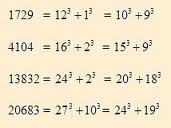Ramanujan Loves 1729
 1729 can be expressed as the sum of two perfect cubes in two distinct ways.
1729 can be expressed as the sum of two perfect cubes in two distinct ways.
How many such numbers exist?
Hint: Given one set of such numbers, how could you construct another set?
This section requires Javascript.
You are seeing this because something didn't load right. We suggest you, (a) try
refreshing the page, (b) enabling javascript if it is disabled on your browser and,
finally, (c)
loading the
non-javascript version of this page
. We're sorry about the hassle.
If N = a 3 + b 3 = c 3 + d 3 we have: n 3 ⋅ N = ( n a ) 3 + ( n b ) 3 = ( n c ) 3 + ( n d ) 3 for any integer n .
Since (na), (nb), (nc) and (nd) are integers too, n 3 ⋅ N is a taxicab number as well.
Thus, given any taxicab number we can generate a greater taxicab number, so there are infinitely many!
Example:
1 7 2 9 = 1 2 3 + 1 3 = 1 0 3 + 9 3 → 1 3 8 3 2 = 2 4 3 + 2 3 = 2 0 3 + 1 8 3 → 4 6 6 8 3 = 3 6 3 + 3 3 = 3 0 3 + 2 7 3 → ⋯